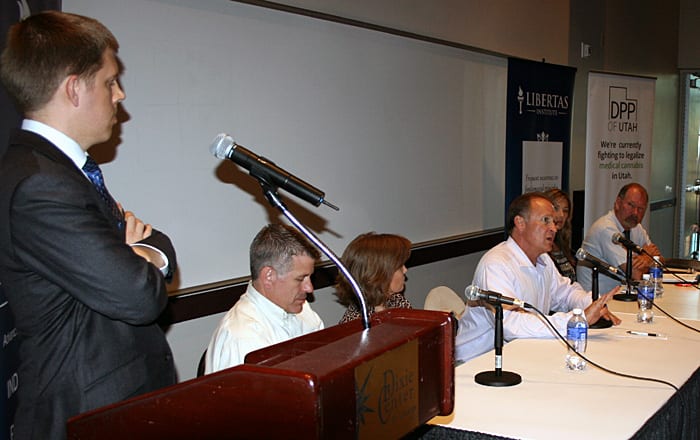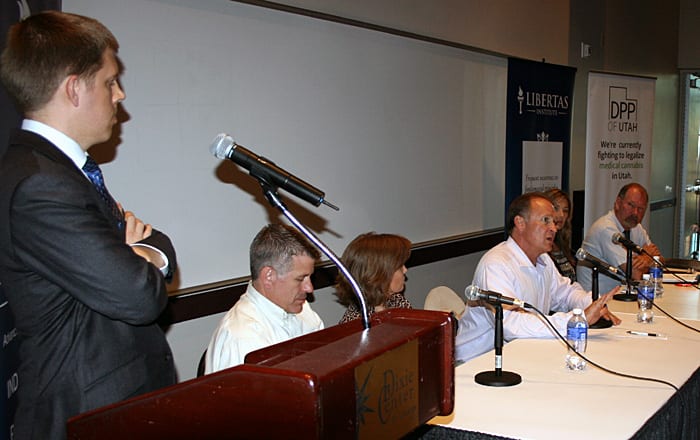
Written by Marcos Camargo and George Scott
Over 100 people gathered at the Dixie Center on Thursday, July 16, to participate in a forum hosted by Libertas Institute to discuss options for legalizing medical cannabis use in Utah. While the forum focused primarily on legislation being advanced by Utah Sen. Mark Madsen (R-Saratoga Springs), other considerations—including the possibility of a referendum—were mentioned
This forum was the third in a series being conducted around Utah. The first, held in Ogden, focused on the law enforcement aspect of legalizing medical cannabis. The second, presented in Provo, focused on patients. This third forum covered multiple topics and allowed southern Utahns the opportunity participate in the debate. Additional forums are being scheduled in northern Utah and will include presentations addressing medical research and the science of medical cannabis, PTSD, veterans, suicide, and other topics concerning the push to legalize medical cannabis.
The Libertas Institute panel at the Dixie Center featured panelists representing a broad range of professional and personal expertise. While panelists shared unique perspectives and experiences relating to medical cannabis use, they were unanimous in their support for Madsen’s legislation. The panel included host Connor Boyack, president of Libertas Institute; Dr. Mike Wilson and his wife, Jenny Wilson; Utah Sen. Mark Madsen; Christine Stenquist, executive director of the Drug Policy Project of Utah; and David Doddridge, retired narcotics officer.
Mike and Jenny Wilson offered a multi-tiered perspective. As a medical professional, Dr. Wilson is uniquely qualified to discuss the scientific and legal hypocrisy behind cannabis prohibition.
Since cannabis is classified as a Schedule I narcotic, it makes the study of its properties problematic in the United States. Dr. Wilson shared how the research process works and the difficulty in studying Schedule I drugs. Some within the medical community claim most studies are largely anecdotal, and Dr. Wilson acknowledged the majority of research remains stagnant and believes it is impeding further study.
“This is how most medicine has been developed. We have case studies then move on to blind and placebo studies,” Wilson said. “It is hypocritical to require the last step be the first step. We cannot get there without allowing for the studies to take place.”
Wilson said that scientific investigations have shown that THC, the active ingredient in cannabis, is toxic to cancer cells. In addition, Dr. Wilson reported that there are multiple studies to consider from several countries, with extensive research coming out of Israel and Germany.
Jenny Wilson was there to not only support her husband professionally but was also representing her family in relating the tragic experience they recently faced. The Wilsons lost their young daughter three weeks earlier following her bout with a brain tumor. Jenny Wilson spoke of trying a wide variety of medical treatments but had waited too long before seeking treatment using the healing properties found in cannabis. She moved with her daughter to Nevada in the last days of her life in order to legally include the drug in her treatment. However, Nevada’s medical marijuana system is not fully developed, with legal dispensaries but inadequate supply and infrastructure, making it difficult to determine strains and potency.
With meticulous detail, Utah’s proposed legislation addresses every aspect of medical cannabis regulation, starting with growth of the plant, how doctors recommend the drug to patients (due to continued federal prohibitions on cannabis, a recommendation cannot legally be classified as a prescription), the classifications of strains and potency, and dispensing.
Dr. Wilson stated, “One of the concerns the medical community has is they claim it only addresses symptoms. Even if true, those symptoms are horrible and it is great to be able to reduce them.”
Jenny Wilson added, “There are no deaths from the toxicity of cannabis.”
Sen. Madsen has been the leading voice in support of legalizing medical cannabis in Utah. He comes from a strong LDS background and is the grandson of former LDS Church President Ezra Taft Benson. He is a self-proclaimed conservative but sees medical cannabis as a matter of personal freedom. Madsen described his work to establish a system of state dispensaries as “very humbling and overwhelming.”
Madsen suffers from chronic pain, and in early 2015, he decided to travel to Colorado to try legal marijuana as an alternative to his regimen of heavy painkillers and invasive procedures.
Madsen recounted his experience consuming marijuana candy. After waiting for several minutes, half expecting a ‘reefer madness’ experience, Madsen said he suddenly realized that “people [had] been lying to me about [cannabis] since sixth-grade.” This response garnered some laughter and clapping from the audience.
The experience in Colorado, along with his interactions with very ill patients, sealed Madsen’s conviction that marijuana prohibition has been nothing but a worthless propaganda stunt by the government.
“Only the government can create a black market,” Madsen said. He said he believes government overreach has created a multi-billion dollar black market and has prevented suffering patients from a safe and effective form of pain relief.
Madsen admitted that his proposed legislation is “narrower than [he] would have liked,” but he thinks it is an important first step in changing public perception of medical cannabis.
Madsen also stated that “it is entirely possible that the people of Utah, in their infinite wisdom will go to full [cannabis] decriminalization,” which he said he believes would not be a bad decision. He said that his bill has widespread public support; enough that he is convinced that if the Utah Legislature does not act in 2016 and pass his bill, the people of Utah will legalize some form of medical cannabis by voter referendum the following fall.
When asked how long it would take for a medical system to be put in place if his legislation is passed, Madsen said he sees it taking no longer than 15 months from the present. If this timeline holds true, Utah could have medical marijuana by Halloween of 2016.
Christine Stenquist, the executive director of Drug Policy Project of Utah, shared information and stories representing those she has worked with in her position. However, it was her personal story that captured the attention of those in attendance.
Growing up with a father working as a narcotics officer in Miami, living in a conservative state, and having never used recreational drugs, Christine’s story represented a personal transition from opposition to drugs to advocating cannabis use. Stenquist has suffered from severe chronic migraines since childhood. However, it was not until she was enrolled in college with dreams of becoming a nurse that she found her life being thrown down another path.
While working her shift at the hospital, Stenquist passed out in the hallway. She was rushed to the ER and remained in a coma for several days. An MRI located a large benign brain tumor, but brain surgery was unsuccessful in removing it completely. She spent the next 15 years bedridden in excruciating pain.
“I was left broken,” Stenquist said.
A parade of prescription medications were unable to curb the pain.
“I have been cycled through over 30 different prescription pain medications with no relief,” she said.
No longer able to hold a job or participate in family life, Stenquist said she was “no longer ‘living,’ just occupying my body.”
She reached a point where she could no longer walk, eat or take care of herself. In her desperation, she researched marijuana use for medical treatment. She also called her father to ask him what he thought, to which he told her marijuana is ‘not the evil drug it is made out to be.’
Having gained his “approval,” she gave cannabis a try.
“Within two weeks of buying and using my first marijuana, I was walking,” she said. “I’m not thumbing my nose at law enforcement. I have a great deal of respect for the law and my dad.”
With continued use of cannabis to treat her condition, Stenquist is now prescription-drug free. She can walk, work, drive a car, and be both physically and mentally present in the life of her family.
Dave Doddridge, former narcotics officer turned prohibition opponent, brought a law enforcement perspective to the forum. He said that many in law enforcement are beginning to see cannabis prohibition as a waste of energy, resources, and human life.
“Marijuana in general is hurting law enforcement,” Doddridge said.
Doddridge said he believes the currently proposed legislation does not go far enough.
“To me, Senator Madsen’s bill is too restrictive,” Doddridge said. “But you have to make it swallowable.”
Doddridge said the biggest roadblock in dismantling cannabis prohibition is the money involved. He said that law enforcement receives huge revenues from asset seizures coming from drug enforcement. Many of these seizures occur before a defendant is even convicted in a court of law and that this enormous stream of side revenue has made many law enforcement agencies hesitant to come out in support of medical cannabis and decriminalization laws.
Anyone interested in the effort to legalize medical cannabis or looking for more information on future public forums can contact the Libertas Institute and the Drug Policy Project via their websites at libertasutah.org and www.dpputah.org.




